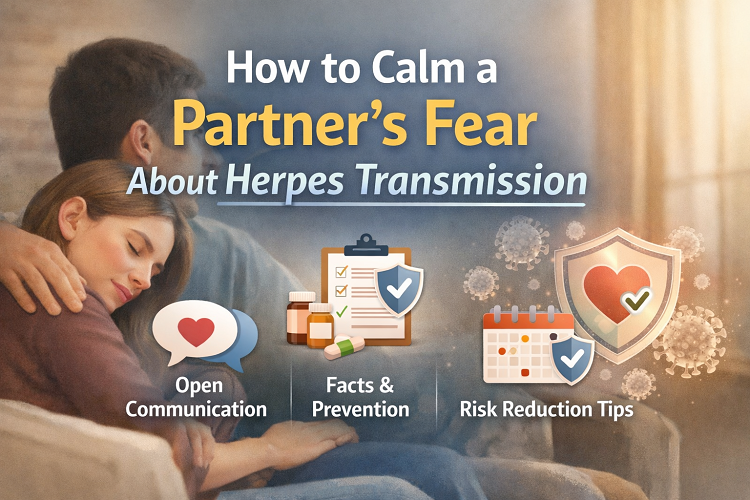Discovering that your Ex Gave You Herpes can feel like a heavy emotional blow. The shock, anger, sadness, and confusion can all hit at once. Beyond the physical symptoms, the emotional pain of betrayal and stigma can be overwhelming. But you are not alone—and this diagnosis does not define your worth or your ability to have love, health, and happiness again.
In this guide, we’ll explore the emotional and practical steps you can take to heal, cope, and move forward with strength after discovering you have herpes. You’ll also find guidance on managing relationships, self-image, and mental health while rebuilding your confidence.
Understanding What It Means When Your Ex Gave You Herpes
Learning that your ex transmitted herpes to you can trigger a wave of emotions. You might feel angry that they didn’t disclose their status or heartbroken that trust was broken. Understanding herpes, both medically and emotionally, is the first step toward healing.
Herpes is one of the most common sexually transmitted infections in the world. It’s caused by the herpes simplex virus (HSV), which comes in two types: HSV-1, typically linked to oral herpes, and HSV-2, associated with genital herpes. However, both can appear in either location. Many people carry the virus without symptoms, meaning your ex may not have even known they had it.
Realizing this can help ease the anger. Herpes is not a reflection of morality, cleanliness, or loyalty—it’s a medical condition that millions of people live with. Understanding this helps you move from blaming to focusing on your own recovery and emotional peace.
The Emotional Shock: Betrayal, Anger, and Grief
When you first learn that your ex gave you herpes, the emotional reaction can be as painful as the physical symptoms. You might question everything—your relationship, your judgment, even your self-worth.
These feelings are valid. Betrayal and anger are natural reactions to being put in a situation that feels unfair or preventable. You may replay conversations, wondering whether your ex knew, or why they didn’t tell you. It’s okay to grieve the trust that was lost. Allowing yourself to feel these emotions is part of the healing process.
Over time, it helps to shift the focus from why it happened to how you can move forward. Emotional healing doesn’t happen overnight, but recognizing that you are not to blame is a powerful start. Herpes doesn’t make you unlovable or “damaged.” It simply means you are human and now navigating a health condition like millions of others.
Accepting the Diagnosis: Letting Go of Shame and Stigma
One of the biggest challenges after a herpes diagnosis is confronting the shame that often surrounds it. Society has unfairly stigmatized herpes, even though it’s one of the most common STIs. The truth is, herpes doesn’t define your worth, your character, or your future relationships.
Acceptance begins with knowledge. Herpes is manageable with medication, healthy lifestyle habits, and communication. Many people with herpes live normal, happy, and romantic lives. Understanding this truth helps you reclaim control over your story.
If you’re struggling with internalized shame, consider joining herpes support groups or online communities where you can share your experiences openly. Talking to others who have been in your shoes can help dissolve feelings of isolation. You’ll realize that having herpes doesn’t end your life—it simply begins a new chapter of self-awareness and resilience.
Coping with the Physical and Emotional Symptoms
Managing herpes means addressing both your physical symptoms and emotional wellbeing. On the physical side, antiviral medications such as acyclovir or valacyclovir can reduce outbreaks and minimize transmission risk. Maintaining a balanced diet, getting enough rest, and managing stress can also help keep symptoms under control.
Emotionally, it’s normal to feel anxious or fearful about your health or future. Many people experience depression or anxiety after diagnosis, especially when herpes is linked to betrayal by an ex. Therapy, journaling, or talking to a trusted friend can help release those heavy emotions.
You might not be able to change the past, but you can absolutely choose how you respond to it. Building emotional strength will make you more capable of handling future relationships with honesty and confidence.
Reclaiming Your Self-Esteem After a Herpes Diagnosis
One of the hardest parts of discovering your ex gave you herpes is the blow to your self-esteem. You might start doubting your attractiveness, your desirability, or your right to intimacy. But remember—herpes doesn’t define your worth. You are still the same person you were before the diagnosis.
Start by practicing self-compassion. Speak to yourself the way you would to a close friend who’s going through a tough time. Replace self-blame with self-care. Treat yourself kindly, nurture your body, and do things that make you feel beautiful and alive.
Rebuilding confidence is a gradual process. As you learn more about herpes and connect with others who understand, you’ll start realizing how common it is—and how little it should change your life. The more you normalize it for yourself, the less power the stigma will have over you.
Confronting Your Ex: To Talk or Not to Talk
It’s natural to wonder whether you should confront your ex about giving you herpes. The answer depends on your emotional readiness and the situation.
If your ex knew about their status and failed to disclose it, you may feel compelled to express your anger or demand accountability. In such cases, confrontation can bring closure, but it should be done calmly and safely. You can choose to do it in person, through a message, or even with the guidance of a counselor.
However, if your ex was unaware of their infection, confronting them might not serve much purpose other than reopening emotional wounds. Remember that closure often comes from within—not from an apology or explanation from someone else. Focus on your own healing rather than trying to make sense of their actions.
Dealing with Trust Issues and Future Relationships
After being hurt by someone you trusted, it’s understandable to feel hesitant about dating again. You may worry about being rejected because of your diagnosis or fear getting hurt again. But with time, honesty, and the right person, love and intimacy are absolutely possible.
When you’re ready to date again, start slowly. Practice open communication with potential partners. Disclosing your status can feel scary, but it’s also an opportunity to see who truly respects and values you. Many people find that honest conversations about herpes actually build stronger emotional connections.
You don’t have to rush into anything. Focus on building trust gradually and choosing partners who show empathy and understanding. The right person will see you for who you are—not for the virus you carry.
Healing from Betrayal: Turning Pain Into Strength
When your ex gives you herpes, it can feel like your entire sense of safety and trust has been shattered. But over time, you can turn that pain into power. Healing from betrayal involves forgiving yourself—not necessarily your ex. Forgiveness doesn’t mean excusing what happened; it means freeing yourself from the emotional chains that keep you stuck in resentment.
Every difficult experience offers lessons. Maybe this one teaches you about boundaries, honesty, or self-protection. Maybe it shows you your own capacity for resilience. When you use your pain as fuel for growth, you transform a moment of suffering into a foundation for strength.
You are not defined by what happened to you, but by how you rise from it.
Living with Herpes: Managing Stigma and Embracing a New Normal
Herpes is a lifelong condition, but it doesn’t have to be a life-limiting one. Millions of people live with herpes while maintaining fulfilling relationships, careers, and happiness. The key is learning how to manage both the physical and social aspects of the condition.
Educate yourself about herpes facts—what it is, how it spreads, and how to reduce transmission. This knowledge not only protects your partners but also helps you feel empowered rather than ashamed.
To combat stigma, normalize conversations about STIs. When people speak openly and honestly about herpes, it helps break down misconceptions and promote compassion. You can even become a voice for awareness, helping others feel less alone in their journey.
Finding Support: You Don’t Have to Go Through It Alone
Support is crucial when healing from a herpes diagnosis caused by an ex. Whether you join a local herpes support group, connect with others online, or confide in a trusted therapist, sharing your story helps you feel understood and accepted.
Many people find comfort in online communities where members discuss symptoms, dating experiences, and emotional recovery. These spaces remind you that you’re not alone—there are countless people living vibrant lives with herpes who understand exactly what you’re going through.
Support networks can also help you rebuild hope and teach you practical coping strategies. When you surround yourself with understanding people, your healing journey becomes lighter and more empowering.
Self-Care and Mental Health After a Herpes Diagnosis
Healing from herpes isn’t only about treating outbreaks—it’s also about protecting your mental health. Stress, anxiety, and shame can all weaken your immune system and trigger outbreaks, creating a vicious cycle.
Make self-care a priority. Focus on getting enough sleep, eating balanced meals, exercising, and practicing relaxation techniques like meditation or deep breathing. Therapy can also help you process complex emotions such as guilt, anger, or sadness.
Remember, mental healing takes time. Celebrate small victories—like the day you realize you went an entire week without feeling anxious, or when you smile at your reflection again. Every step forward counts.
Dating with Herpes: Confidence, Honesty, and Hope
When you’re ready to re-enter the dating world, remember that you deserve love and intimacy just like anyone else. Dating with herpes is not about hiding—it’s about confidence and clear communication.
Many people worry about disclosure conversations, but the truth is, honesty often builds deeper trust. When you share your status openly and calmly, you empower yourself. You also give your partner the chance to see your integrity and courage.
Today, there are also herpes dating websites and communities designed specifically for people who prefer connecting with others who understand their condition. These platforms offer safe, judgment-free environments where honesty and respect are the norm.
Moving Forward: A New Chapter of Empowerment
The moment you realize your Ex Gave You Herpes can feel like your world has fallen apart—but over time, it can become a turning point for growth. You can choose to transform the experience into self-empowerment, strength, and wisdom.
Herpes may change your health journey, but it does not change your worth or your future. With knowledge, compassion, and support, you can rebuild your confidence, form meaningful relationships, and create a life filled with love and purpose.
Your diagnosis is not the end—it’s simply a new beginning. Healing starts the moment you choose to forgive yourself, care for your body, and believe that brighter days are ahead.



